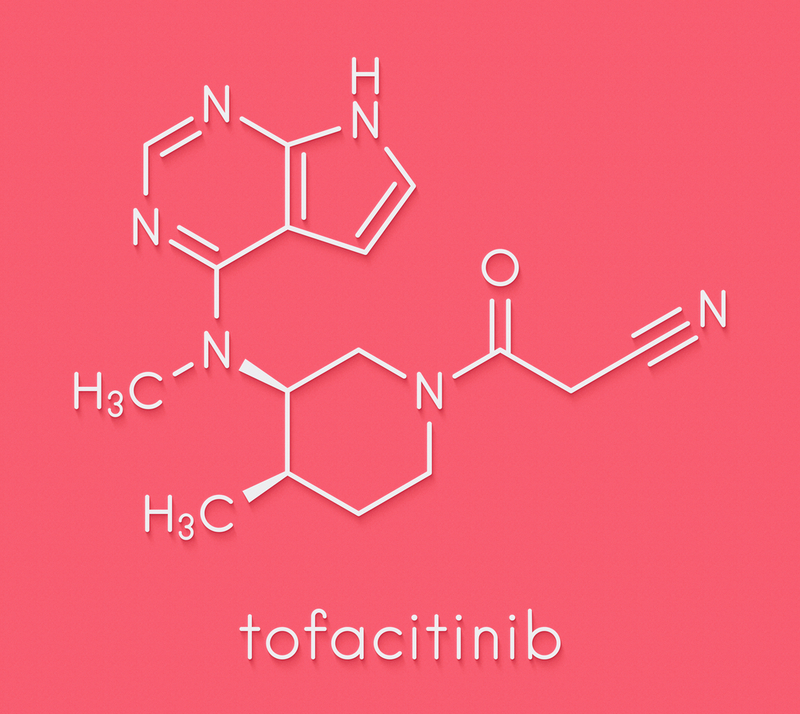What to know about Xeljanz
Healthline/Medical News Today Jun 28, 2019
Xeljanz (tofacitinib) is a prescription medication that helps treat moderate to severe rheumatoid arthritis (RA), psoriatic arthritis, and ulcerative colitis. Tofacitinib can reduce swelling and pain in the joints. However, it also weakens the immune system, which can leave people susceptible to infections.

Continue reading this article to learn more about tofacitinib, including when doctors prescribe it, the dosage, side effects, warnings, and interactions with other medications that can occur.
What is it?
In 2012, The Food and Drug Administration (FDA) approved tofacitinib, which is the active ingredient in Xeljanz, to treat moderate to severe RA in people who cannot tolerate methotrexate. The FDA has also approved Xeljanz to treat moderate to severe ulcerative colitis.
How does it work?
Tofacitinib acts as a Janus kinase (JAK) inhibitor. It prevents inflammatory enzymes called cytokines from stimulating the body's immune response. Cytokines include various substances, such as tumor necrosis factor (TNF), interleukins, and transforming growth factor (TGF), that play critical roles in RA and other immune-mediated inflammatory diseases.
When a cytokine binds to a JAK receptor, it begins a chain of chemical reactions that cause systemic, or widespread, inflammation. JAK inhibitors, such as tofacitinib, block JAK receptors from signaling other immune responses.
Uses
Tofacitinib treats chronic inflammatory disorders that include RA, psoriatic arthritis, and ulcerative colitis.
How to take and dosage
Tofacitinib comes in two varieties, which are a regular tablet or an extended release (XR) tablet. People can take the tablets whole, with or without food. Adults with RA and psoriatic arthritis can choose between the following dosages:
- Xeljanz regular: 5 milligrams (mg) twice daily
- Xeljanz XR: 11 mg once daily
Adults with ulcerative colitis will take 10 mg of regular Xeljanz twice daily for at least 8 weeks. After this period, their doctor will re-evaluate their symptoms. Depending on how the person responds to the treatment, a doctor may recommend reducing the dosage to 5 mg twice daily.
People can take tofacitinib in combination with disease modifying drugs, such as methotrexate or azathioprine. However, they will take half the regular dose of tofacitinib.
People who have kidney or liver damage may have more difficulty metabolizing tofacitinib. This means that they will have higher concentrations of the medication in their blood. Doctors will prescribe lower doses for people who have moderate to severe kidney or liver damage because of this fact. Doctors may interrupt the treatment if a person develops the following conditions:
- Low red blood cell counts, known as anemia
- Low white blood cell counts, known as neutropenia
- Low lymphocyte counts, known as lymphopenia
- Severe infections
In pregnancy, some evidence suggests a link between tofacitinib and miscarriage, preterm labor, and low birth weight. However, there are currently not enough data to establish a clear link between tofacitinib and adverse birth effects.
The National Institutes of Health (NIH) have an ongoing pregnancy exposure registry to monitor pregnancy outcomes in women who are taking Xeljanz or Xeljanz XR. Women taking tofacitinib can enroll in the pregnancy registry by calling the toll-free number 1-977-311-8972.
Side effects
Tofacitinib can cause a variety of side effects, such as:
- Upper respiratory tract infections
- Headache
- Diarrhea
- Swollen lymph nodes
- High blood pressure
- Shortness of breath
- Chest or back pain
- Coughing up blood
- Excessive sweating
- Clammy or blue-colored skin
Warnings
Although tofacitinib can help treat immune system-related inflammatory disorders, it can cause adverse effects in specific populations, as follows.
Serious infections
Tofacitinib affects the immune system, which can leave people vulnerable to infections. According to the NIH, serious infections among adults taking tofacitinib usually affect people over 65 years of age, and those who have diabetes.
People who have low lymphocyte counts should not take tofacitinib. An individual who experiences frequent severe infections can take tofacitinib, but they should carefully consider the costs and benefits of this treatment option with their doctor.
Cancerous growths
People who have RA may have a higher risk of developing some cancers, such as lung, skin, and lymphoma. A common problem that doctors associate with immunosuppressive treatments, such as tofacitinib, in people with RA is an increased risk of nonmelanoma skin cancer.
Blood clots
In 2019, the FDA released a safety announcement citing a clinical trial that found an increased rate of blood clots in the lungs, or pulmonary embolism, of people with RA who were taking 10 mg of Xeljanz and Xeljanz XR twice daily. The FDA has approved 10 mg twice daily to treat ulcerative colitis, but not RA or psoriatic arthritis.
Drug interactions
Tofacitinib may interact with specific medications, including:
- Moderate to strong CP3A4 inhibitors, such as ketoconazole
- Strong CP3A4 inducers, such as rifampin
- Strong CYP2C19 inhibitors, such as fluconazole
- Immunosuppressive drugs, such as azathioprine, cyclosporine, and tacrolimus
People must inform their doctors of any current medications they are taking before starting tofacitinib.
Cost
Tofacitinib has no generic alternatives at this time. The cost of tofacitinib varies, depending on an individual's insurance. Private insurance companies can cover most of the cost, if not the entire cost. Medicare Part D and Medicaid can cover a portion of the cost. People eligible for the Pfizer Patient Assistance Program can receive Xeljanz or Xeljanz XR at no cost. People who do not have insurance can get more information and apply for financial assistance at the Xeljanz website here.
Summary
Tofacitinib is a prescription medication that doctors give to treat inflammatory conditions, such as RA, psoriatic arthritis, and ulcerative colitis. Tofacitinib acts as a JAK inhibitor and lowers the body's immune response. This action can help control inflammation, but it can also leave the body vulnerable to severe infections.
-
Exclusive Write-ups & Webinars by KOLs
-
Daily Quiz by specialty
-
Paid Market Research Surveys
-
Case discussions, News & Journals' summaries